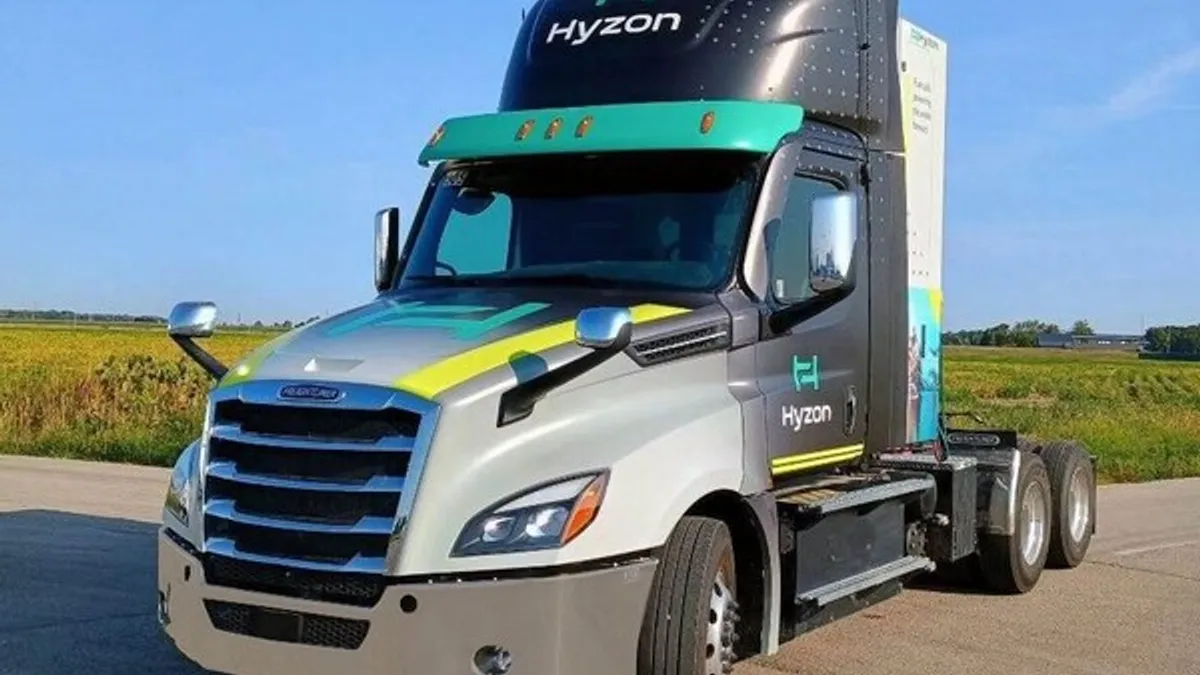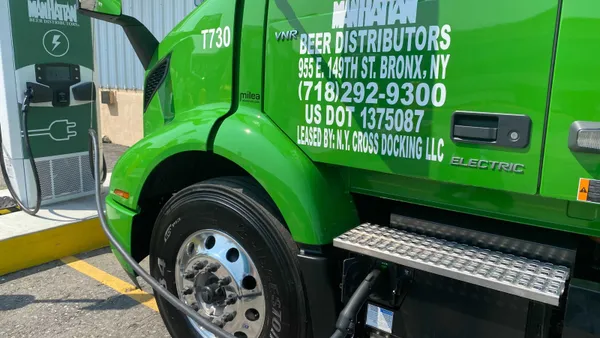Today’s carriers face unprecedented challenges. From relentless rate pressures to increasingly complex customer demands, the industry is in a constant state of flux. To survive and thrive in this cutthroat environment, carriers must find ways to stand out from the pack, streamline their operations and gain better visibility into their fleet's performance.
Enter the Transportation Management System (TMS) – a tool that has become indispensable for carriers looking to optimize their operations, boost efficiency and maintain a competitive edge.
Selecting the right carrier-focused TMS software can mean the difference between merely staying afloat and steering your business towards sustainable growth and profitability. In this comprehensive review, we'll explore the top Carrier TMS providers, dissecting their unique features and how they address the critical pain points faced by modern carriers.
Truckbase: the modern carrier's gold standard

Truckbase emerges as the top choice for growing asset-based carriers, particularly those managing fleets of 5-50 trucks.
It is an award-winning solution, having recently been named best ease of use, best value, best customer support and most recommended by Capterra and Software Advice. This comprehensive, modern TMS offers immediate ROI through rapid implementation, a user-friendly interface and white glove support to ensure you thrive on the system.
Key features:
- Streamlined dispatch: A powerful yet simple system that eliminates redundant data entry, significantly reducing manual labor and errors.
- Seamless integrations: Compatible with over 30 ELDs, QuickBooks and the ability to leverage EDI connectivity between you and your most important customers, thus ensuring smooth data synchronization across platforms.
- Automated invoicing: Instant invoicing capabilities and a customer portal for 24/7 load visibility, addressing common billing pain points.
- Driver satisfaction: Robust driver settlement features promote clear, trustworthy driver compensation.
- AI-powered efficiency: Automates mundane tasks, allowing teams to focus on strategic activities like securing higher-paying loads.
- Real-time visibility: Integrated truck tracking provides instant load updates and tailored notifications, eliminating unnecessary check calls.
- Mobile friendly: Truckbase offers a user-friendly app to empower drivers to more easily scan and upload BOLs, access schedules and stay updated on the go. For dispatchers and drivers who prefer an optimized mobile web and text-based dispatch experience, Truckbase offers that as well.
Truckbase's AI-powered load importer automates load creation, further streamlining operations. The platform is designed to be turnkey for smaller fleets yet scalable for larger operations, offering a centralized data hub that supports growth without additional administrative burden.
Why choose truckbase?
Truckbase stands out for its balanced approach to trucking dispatch software, catering specifically to the needs of asset-based carriers in the 5-50 truck range, though scales to serve fleets of up to 100 power units. Its focus on automation, efficient data management and driver satisfaction makes it an ideal choice for fleet owners aiming to grow their business while maintaining operational efficiency and high employee morale.
By addressing critical pain points such as data entry redundancy, billing complexities and communication inefficiencies, Truckbase positions itself as a comprehensive solution for modern carriers looking to thrive in a competitive landscape.
Other trucking dispatch software solutions to consider
2. Mcleod Software: the enterprise solution for large carriers
- Target: Fleets with hundreds to thousands of trucks
- Pros: Comprehensive suite including dispatch, routing, optimization and compliance tools
- Cons: High cost, steep learning curve
- Best for: Large carriers with complex logistics operations and resources for implementation
3. AscendTMS: The free option for micro carriers
- Target: Startups and small fleets on tight budgets
- Pros: Cost-effective (free), basic trucking dispatch capabilities
- Cons: Limited functionality for growing fleets
- Best for: Micro carriers and startups with limited resources
4. Axon Software: TMS with integrated accounting
- Target: Carriers seeking an all-in-one solution including accounting
- Pros: Built-in accounting software, comprehensive feature set
- Cons: Less user-friendly accounting system, requires significant manual data entry
- Best for: Carriers willing to adapt to a new accounting system for an integrated solution
5. ITS Dispatch: Specialized for small fleets and brokerage
- Target: Owner-operators and small fleets (1-10 trucks) with brokerage activities
- Pros: Integrated brokerage module, connectivity with Truckstop's load board
- Cons: Lacks advanced features for larger fleets, outdated design
- Best for: Small operations balancing fleet management and brokerage services
6. Google Sheets: Budget-constrained startups
- Target: Startups, owner-operators, budget-conscious operators
- Pros: Free, real-time collaboration, accessible anywhere
- Cons: Lacks dedicated TMS features, requires significant manual input
- Best for: Tech-savvy users willing to create custom dispatch workflows on a tight budget
Conclusion: Choosing the Right Carrier TMS for You
Selecting the right carrier TMS (transportation management system) is a critical decision that can significantly impact a carrier's operational efficiency, growth potential and competitive edge. The ideal choice depends on various factors, including fleet size, operational complexity, budget and long-term business goals.
For growing asset-based carriers, particularly those managing 5-50 trucks, Truckbase is your best bet. Its modern interface, comprehensive feature set and focus on automation make it an excellent choice for carriers looking to streamline operations and drive growth. Truckbase's ability to provide immediate ROI through quick implementation and its emphasis on reducing manual data entry set it apart in a crowded market.
Larger carriers with more complex needs might find enterprise-level solutions like McLeod Software or TMW Suite by Trimble more suitable, despite their steeper learning curves, higher costs and more dated technology. These platforms offer extensive capabilities designed to manage large-scale operations effectively.
For smaller fleets or startups, cost-effective options like AscendTMS or even DIY solutions like Google Sheets can provide basic functionality to get operations off the ground. However, these solutions may quickly become limiting as the business grows to five or more trucks.
Ultimately, the key is to choose a TMS that not only meets your current needs but also aligns with your future growth plans. Consider factors such as ease of use, scalability, integration capabilities and support when making your decision. In today's competitive landscape, the right TMS can be a powerful tool for operational excellence, helping carriers not just survive, but thrive in an ever-evolving industry.
Carrier TMS Software FAQs
What is a Transportation Management System (TMS) and why is it important for carriers?
A TMS is a software solution that helps carriers optimize their logistics operations. It's important because it streamlines processes, improves efficiency, enhances visibility and can significantly impact a carrier's profitability and competitiveness in the market.
How do I choose the right TMS for my carrier business?
Consider factors such as your fleet size, operational complexity, budget and growth plans. Evaluate features like dispatch capabilities, integrations, automation and user-friendliness. It's also important to consider the provider's customer support and the system's scalability.
What are the key benefits of implementing a modern TMS like Truckbase?
Modern TMS solutions like Truckbase offer benefits such as streamlined dispatch, reduced manual data entry, improved driver satisfaction, real-time visibility and AI-powered efficiency. They can provide immediate ROI through quick implementation and help carriers adapt to changing industry demands.
Are there affordable TMS options for small carriers or startups?
Yes, there are affordable options for small carriers and startups. Some providers like AscendTMS offer free basic versions, while DIY solutions like Google Sheets can be used for very small operations. However, as your business grows, you may need to transition to a more robust solution.
How can a TMS help my carrier business stay competitive in a challenging market?
A TMS can help you stay competitive by optimizing routes, improving load management, enhancing customer service through better visibility, reducing operational costs and enabling data-driven decision making. It allows you to streamline operations, which is crucial in a market with tight margins and high customer expectations.










